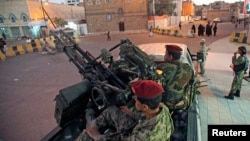Yemen’s Houthi rebels finalized their takeover of the country Friday, claiming a “new era” in that nation’s politics. It is not clear how the rebel power grab will affect Washington’s fight against one of al-Qaida’s most powerful branches, the Yemen-based al-Qaida in the Arabian Peninsula.
State Department spokeswoman Marie Harf said Friday that Washington’s counterterrorism efforts in Yemen were continuing, despite a rebel takeover of the country.
“There are a set of security forces inside Yemen that we are working with, that we have been working with, and that we are continuing to work with,” said Harf.
Houthi rebels formally dissolved parliament and established a presidential council to replace President Abd Rabbuh Mansour Hadi.
Hadi had been a key ally in Washington’s fight against AQAP, the group that most recently claimed responsibility for the gun attack against the French satirical magazine Charlie Hebdo that left 12 dead.
The rebels announced they would form a transitional government run by a five-member council and establish a 551-person parliament.
The takeover came after the country’s political factions failed to agree on a solution to the political crisis sparked when the rebels stormed into the capital five months ago.
Harf said Washington will continue to consider Hadi the legitimate president until the parliament accepts his resignation. Hadi offered to resign last month when his residence was surrounded by the rebels.
It is not clear what the status is of that resignation given that the parliament has been dissolved. Also unclear is what direction the country will take under the pro-Iranian Houthi.
Declining to term the takeover a coup, Harf said Washington was closely watching the political transition. “Obviously it’s a very fluid situation on the ground; we are closely monitoring developments.”
The United States has called for a political solution based on a broad consensus of all Yemeni stakeholders.
Yemen is deeply divided along tribal and religious lines. The Houthi’s traditional power base is in the north. Hadi comes from the south, a region that refused to recognize the Houthi’s power and has threatened to secede.





